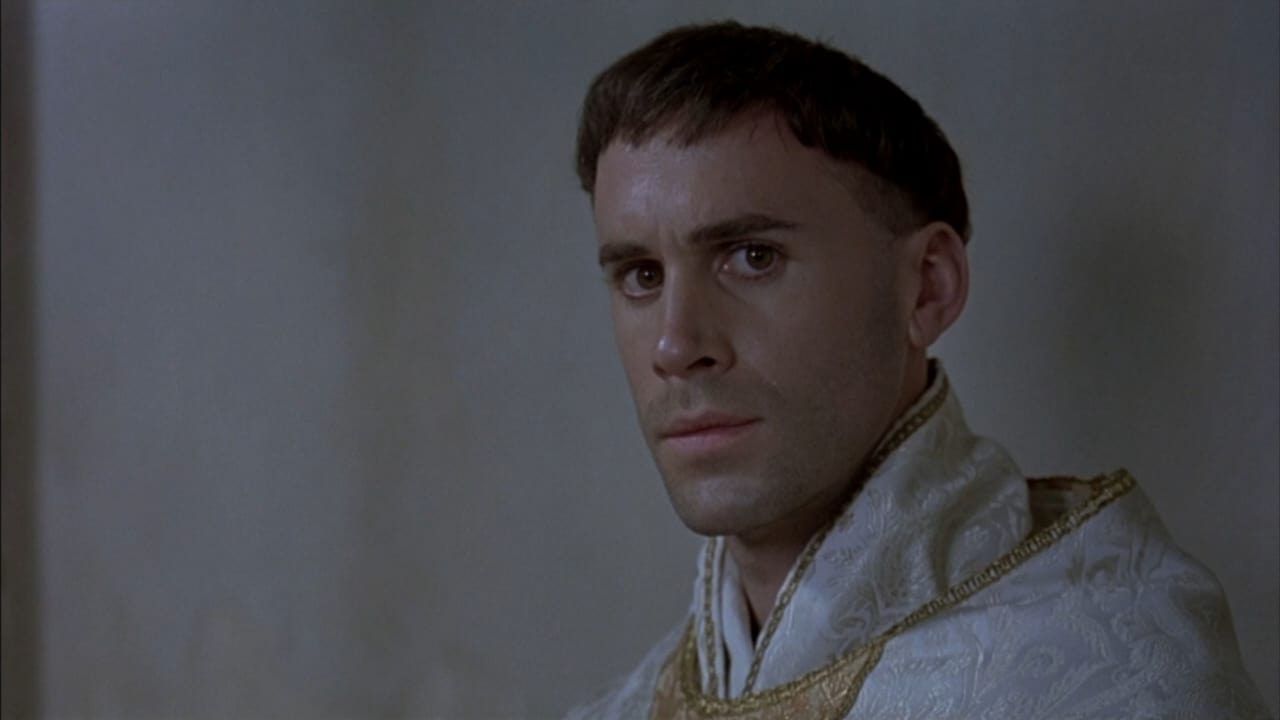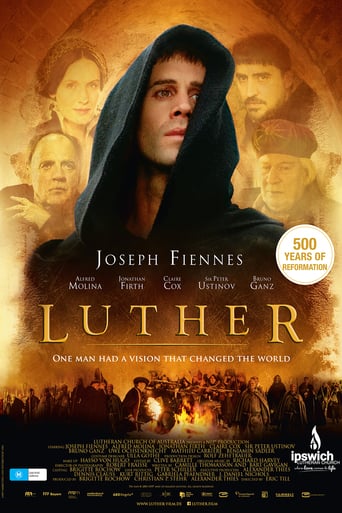

People are voting emotionally.
... View Moreone of my absolute favorites!
... View MoreVery good movie overall, highly recommended. Most of the negative reviews don't have any merit and are all pollitically based. Give this movie a chance at least, and it might give you a different perspective.
... View MoreThe best films of this genre always show a path and provide a takeaway for being a better person.
... View MoreIn Roger Ebert's review of Luther he criticizes the filmmakers for showing Martin Luther as being a bit neurotic. Ebert writes "I doubt if he was much like the uncertain, tremulous figure in Luther who confesses, 'Most days, I'm so depressed I can't even get out of bed'." A contrasting view is offered by Steven D. Greydanus. In an article written for the National Catholic Register, Greydanus criticizes the film for making Luther too inspiring and for not taking "a more critical warts-and-all look at its hero."I am somewhat sympathetic to both criticisms. Ebert is right that Luther is depicted as a deeply troubled man, but I am convinced that there are two categories of people in the world, those who are troubled and those who aren't paying attention. It is perhaps this aspect of Luther's life that made him an interesting case for psychologist Erik Erikson (Young Man Luther). On the other hand Greydanus is right that some of Luther's "warts" (anti-Semitism for example) seem to have been surgically removed. Movies like this will always generate ideological debates about the film's departure from "true" history. Picasso once said "art is a lie which makes us realize the truth. If we grant that there are inevitable omissions, distortions, and unwarranted emphases we can move on to the more important question of truths to be realized. With that as my emphasis I can heartily recommend Luther as an inspiring story of faith, courage, and prophetic critique. By not focusing exclusively on Luther's personality, director Eric Till also makes it an engaging account of corruption, cooptation, and political struggle.Eric Till's previous directing credits include The Muppet Christmas and Bonhoeffer: Agent of Grace, a diverse filmography to be sure. There are flaws in the story line and several critics have rightly criticized the story for including Luther's marriage as a "happily ever after" footnote. In spite of these flaws there are some real strengths here in the writing and direction. Joseph Fiennes does an excellent job as Martin Luther, and Sir Peter Ustinov is perfectly cast as Frederick the Wise.The central point of the film is that the church is in danger of losing its way when it becomes too accommodating to the "powers that be". Martin Luther, like his namesake Martin Luther King, was an important prophetic voice who called us to critical awareness of the principalities and powers and how they shape our world. If the film did nothing more than cause us to reflect more thoughtfully on this, it would be worth the journey. This is admittedly a film with flaws. But if you are up for an engaging film with a little more substance than one of the cloned sequels dominating the theaters of late, two hours with Martin Luther would be time well spent.
... View MoreIn retrospect, it is hard to believe that it took until 2003 for a movie about Martin Luther (1483-1546) and the Lutheran Reformation to reach the big screens. Made through the cooperation of the Lutheran and the Catholic Churches, Eric Till's LUTHER begins with Luther's days as a young, novice Catholic monk and ends just as the Lutheran Church itself is being formed. The movie is gorgeous to look at: the settings are beautiful (yet not improbably "clean"), the costumes even more so. Richard Harvey's musical score, as exquisitely crafted as a medieval tapestry, is surely one of the greatest movie scores composed within the last fifteen years. Its main themes stay in the memory long after the screen has gone dark.It is easy to see why Joseph Fiennes, then fresh from Shakespeare IN LOVE, was cast as Martin Luther: thin and fair, even pale, he looks like nineteenth-century depictions of the young Luther by such artists as James Tissot, and not unlike the few from-life portraits of him. Fiennes' long face, with wide hazel eyes that can burn with fear, anger, or compassion, is always "readable," a perfect reflector of emotion. He is great at conveying the young monk's sincere piety, extreme anxiety about Hell, and barely controlled rage at the Church corruption he sees. His scenes with his sympathetic confessor (Bruno Ganz) and his scene before the intimidating Cardinal Cajetan (Mathieu Carriere) are particularly poignant and riveting, as are the scenes in which he visits Rome and sees its corruption firsthand.Though Luther's disillusionment with the Catholic Church is clear in Fiennes' portrayal, the staunch Catholics in LUTHER are not cardboard villains. The kind-faced Alfred Molina, for example, makes indulgence seller Johan Tetzel oddly easy to relate to; you feel that his intentions are pure. Jonathan Firth (younger brother of Colin, just as Joseph Fiennes is the younger brother of Ralph) is an elegant Giralomo Aleander, the Vatican official who oversees Luther's trial. Sir Peter Ustinov (himself a Lutheran), who died just months after LUTHER premiered, is a joy to watch as Prince Frederick the Wise, Luther's supporter. Other delights include the German actor Torben Liebrecht, who looks uncannily like the youthful portraits of the Holy Roman Emperor he portrays; a "cameo appearance" by Louis Cranach, the Renaissance artist who painted Luther's portrait; and a period song with which Claire Cox, who makes the most of her brief scenes as Luther's strong-willed wife, serenades her fiancé.The movie's one drawback is its less-than-perfect screenplay. The "riot" scenes that follow Luther's trial (the smashing of the icons, the Peasants' Revolt) are telescoped, melodramatic, and simply less interesting than are the "theological" scenes. Moreover, the screenplay seems to assume a certain level of prior audience familiarity with both medieval theology and Reformation history; it would be good, then, to know something about both before watching LUTHER. But theology is a hard topic to make entertaining for the masses, and in LUTHER the attempt was very nearly a complete success.
... View MoreA Great Educational film from start to finish, discovering that faith in Christ Jesus alone saves and not by any works we do, tho we do good works not to merit salvation, but in appreciation of Christ's finished work on Mt. Calvary, and the persecution we endure for steadfast faith in Gods divine word, I pray God will give us the courage to stand without compromise in his divine will like Luther, Tyndale and a host of others did in centuries past, 'For by grace are ye saved through faith; and that not of yourselves: it is the gift of God: not of works, lest any man should boast.'Ephesians 2:8,9 (Authorized (King James) Version)
... View MoreI'm a bit of a history geek so I try to watch most of the movies that are set in a historical setting. Luther was, in the lack of a better word, interesting.There's some fine camera work, acting,the works but it just can't get top marks. It was too modern. Dialogues, interactions, it's too much 20th century. Luther speaks like a modern professor at the university, his students look like a bunch of twenty year olds who can't keep attention during class because they think where they will go out Friday night and so on. You just can't get immersed in the movie because of that.All in all, it's worth watching, but don't expect a masterpiece. 6/10*
... View More